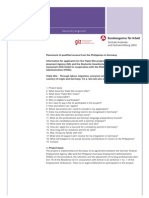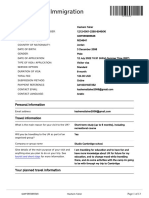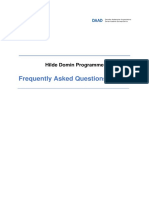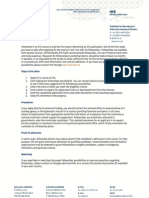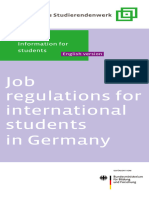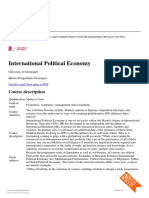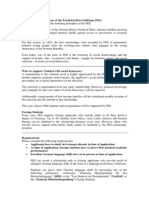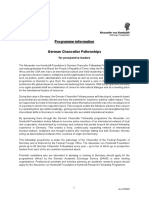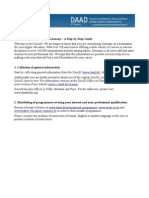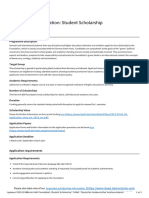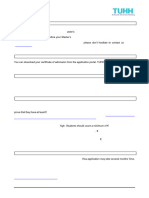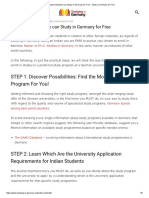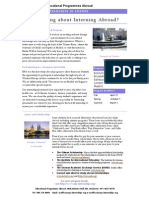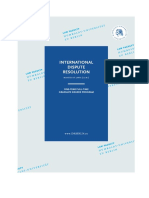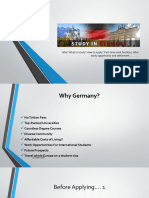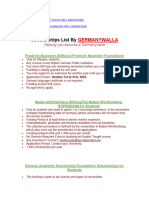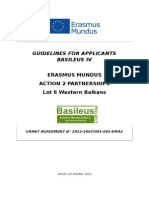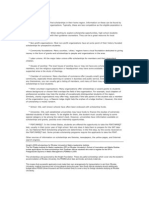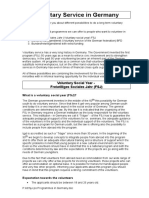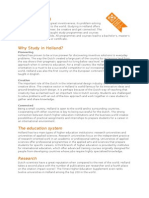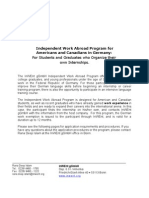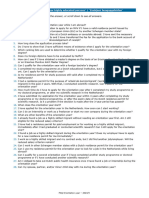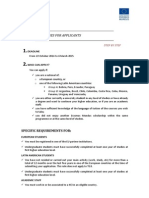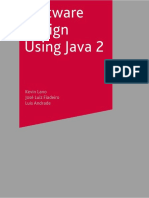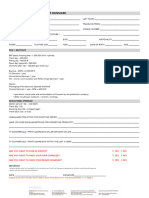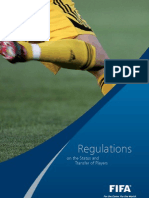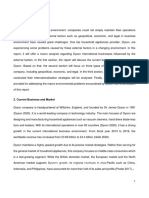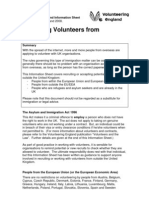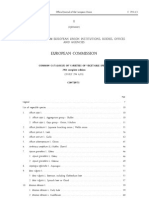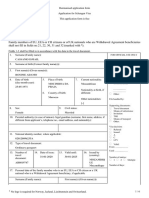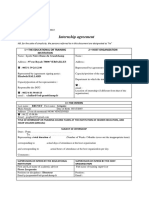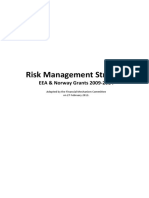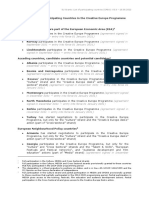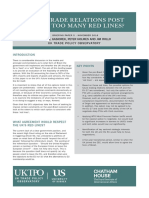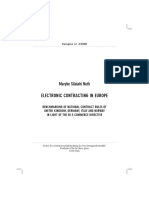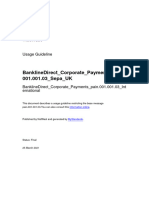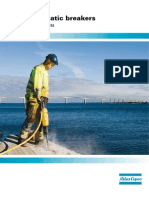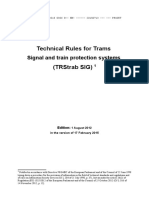Faqs Hilde Domin en
Faqs Hilde Domin en
Uploaded by
Faisal HakimkCopyright:
Available Formats
Faqs Hilde Domin en
Faqs Hilde Domin en
Uploaded by
Faisal HakimkOriginal Title
Copyright
Available Formats
Share this document
Did you find this document useful?
Is this content inappropriate?
Copyright:
Available Formats
Faqs Hilde Domin en
Faqs Hilde Domin en
Uploaded by
Faisal HakimkCopyright:
Available Formats
Hilde Domin Programme
Frequently Asked Questions (FAQs)
________________________________________________________
Hilde Domin Programme – Frequently Asked Questions – 07/2022 Page 1 of 13
Dear Madam or Sir,
the list of FAQs is intended to guide you through the application process and provides answers to
several questions which may arise throughout the nomination/application process.
Please do take the time to read through this document carefully, before contacting the DAAD with
regards to any additional questions you may have.
All answers provided in this document are given to our best knowledge.
Please do take note that this document is not legally binding. The DAAD reserves the right to
make corrections and amendments due to given reasons at any time.
Yours sincerely,
the DAAD team of the Hilde Domin Programme
Hilde Domin Programme – Frequently Asked Questions – 07/2022 Page 2 of 13
TABLE OF CONTENTS
General questions ……………………………………………………………………………………..…… 3
Nomination and application requirements ……………….…………..…………………………….…… 5
Study courses and degree programmes ……….…………………………………………………………. 9
Language requirements ………………………………………………………………………………….. 11
Nomination and selection procedure ……………………………………………………………….…... 12
Hilde Domin Programme – Frequently Asked Questions – 07/2022 Page 3 of 13
GENERAL QUESTIONS
1. Why is the scholarship programme named after Hilde Domin?
Hilde Domin was a German writer, poet, and essayist. She became known primarily for her
poetry, which was influenced by her time in exile and loss of homeland. The latter makes her
an exemplary figure for this programme. A poet of the Jewish faith, she recognised political
developments in Germany at an early stage and fled to Italy in 1932, where she earned a
doctorate in political science in 1935. Domin spent more than 20 years of her life in various
countries, including England, France and Canada, as well as the Dominican Republic, which
became her self-chosen namesake. After returning home to Germany from exile, she became
known as the “poet of return” and received numerous honours for her literary work. Among
others, she was awarded the Carl Zuckmayer Medal, the Nelly Sachs Prize, and the Grand
Federal Cross of Merit.
2. Nationals from which countries can be nominated for the programme?
The programme is open to students and doctoral candidates from all countries across the
globe except for:
• nationals from EU/EEA/EFTA countries
• nationals from Andorra, Monaco, San Marino and the United Kingdom
3. Who is eligible to be nominated?
Students and doctoral candidates who are at risk of being formally or de facto denied
educational rights in their country of origin, due to their ethnic, sexual, gender or religious
identity and/or their political or civic engagement. By definition of the DAAD, political, civic
and similar engagement encompasses either the participation in groups or individual
actions based on liberal and democratic principles aspiring to contribute to a positive social
change in communities.
4. What does the status of risk imply?
The status of risk implies a threat or risk to your personal well-being, in particular your right
to education, and the safety of your life in general.
5. How can I prove my status of risk?
Evidence, that proves your status of risk, may include a personal written account, written
records (e.g. official documents, social media posts, letters detailing/documenting specific
incidents etc.), or witness statements, as well as official confirmation of a granted refugee
status and/or asylum eligibility.
Hilde Domin Programme – Frequently Asked Questions – 07/2022 Page 4 of 13
NOMINATION AND APPLICATION REQUIREMENTS
1. Can I apply for a scholarship or do I need to be nominated?
You cannot apply for a scholarship of the Hilde Domin Programme. You must be nominated
as a candidate by an institution or an organisation that is a legal entity domiciled in
Germany. Upon receipt of the online nomination form, eligible candidates will be invited by
the DAAD to submit their application via the DAAD online portal.
Important to note: Multiple nominations do not bear any advantages. One nomination per
candidate is sufficient.
2. Can I nominate myself?
No, you cannot nominate yourself. You must be nominated as a candidate by an institution
or an organisation that is a legal entity domiciled in Germany.
3. Is there an age limit for the programme?
Candidates must be of legal age (usually at least 18 years old) at the time of nomination. As
a rule, the last university degree should not have been completed more than two years ago
at the time of application. For applicants with a bachelor’s degree, the acquisition of the
university entrance qualification should in general not be more than two years ago at the
time of application.
4. Can a second bachelor’s, master’s or doctoral degree be funded?
No, funding for a second bachelor’s, master’s or doctoral degree is not provided for in this
programme.
5. I am/work as an artist, but I am currently not enrolled as a student at a higher education
institution. Can I still be nominated for this programme?
Yes, you can be nominated for this programme. This scholarship programme is open to all
academic disciplines currently offered at German higher education institutions, apart from
human medicine, dentistry and veterinary medicine.
Candidates in the academic fields of fine arts, performing arts, design, visual
communication, music, film and architecture are required to submit proof of admission to a
study course/degree programme at a German higher education institution by the
application deadline.
Important to note: The Martin Roth-Initiative provides further funding opportunities for
interested candidates working in the sector of arts and culture.
6. I am an activist, not a student. Can I be nominated for this programme?
Unfortunately, you cannot be nominated for this programme. This scholarship programme
is intended for students and doctoral candidates, including but not limited to those with a
recognised refugee status and/or an entitlement to asylum, who are at risk of being formally
or de facto denied educational rights in their country of origin, due to their ethnic, sexual,
gender or religious identity and/or their political or civic engagement. However, we
recommend that you have a look at the Elisabeth-Selbert-Initiative for further funding
opportunities.
Hilde Domin Programme – Frequently Asked Questions – 07/2022 Page 5 of 13
7. I am a postdoctoral researcher. Can I still be nominated for this programme?
Unfortunately, you cannot be nominated for this programme. This scholarship programme
is intended for students and doctoral candidates only. However, we recommend that you
have a look at the Philipp Schwartz Initiative for further funding opportunities.
8. I am a refugee in Germany, or I have applied for a legal status as a refugee in Germany.
Can I be nominated for this programme?
No. Unfortunately, persons who are already in Germany, the European Union, the European
Economic Area (EEA) or the European Free Trade Association (EFTA) at the time of
nomination are ineligible for the scholarship.
9. I have applied for a legal status as a refugee or an asylum seeker in Germany, but my
case has not yet been decided upon. Can I still be nominated for this programme?
No. Unfortunately, persons who are already in Germany, the European Union, the European
Economic Area (EEA) or the European Free Trade Association (EFTA) at the time of
nomination are ineligible for the scholarship.
10. I am already living in a country (not Germany) which is a member of the European
Union, the EEA or EFTA and have a legal title/status as a refugee or an asylum seeker.
Can I be nominated for this programme?
No. Unfortunately, persons who are already in Germany, the European Union, the European
Economic Area (EEA) or the European Free Trade Association (EFTA) at the time of
nomination are ineligible for the scholarship.
11. Can I bring my family along?
Yes, you can bring your spouse and child(ren) along with you. You are eligible to apply for a
family allowance, which comprises of a marital allowance, as well as a child allowance (for
children under 18 years), if your spouse and your kid(s) reside in Germany. If necessary, your
spouse and/or child(ren) can also be insured via the DAAD.
12. What type of visa do I need, or will I be granted?
You need/will be granted a German student visa. A German student visa permits foreign
nationals to enter and stay in Germany for the purpose of studying or completing a study
degree in a certain period of time. Important to note is that you will not be granted a
Humanitarian Residence Permit. For more and binding information about visa
requirements, contact the German embassy or German consulate in your home country or
country of present residence.
13. Am I allowed to take up a job next to studying?
Yes, you are allowed to work next to studying. If you wish to work part-time during your
funding period, you are required to obtain the prior approval of the DAAD. This also applies
to unpaid part-time work.
If your income from part-time work does not exceed 450 EUR per month, this will not affect
your monthly scholarship payment. If, however, the (gross) monthly payment exceeds 450
EUR per month, the excess amount shall be deducted from your monthly scholarship
instalment.
Hilde Domin Programme – Frequently Asked Questions – 07/2022 Page 6 of 13
In addition to the latter, students who are not from EU/EEA/EFTA countries have to ensure
that they do not work more than 120 full days or 240 half days per calendar year without the
approval of the Federal Employment Agency (Bundesagentur für Arbeit). A period of
employment longer than the afore mentioned days must be approved by the Foreigners
Authority (Ausländerbehörde).
14. Do I have to leave Germany immediately after completing my studies, or am I eligible
to search/apply for a job?
No, you do not have to leave Germany immediately after graduation. After you have
graduated, you can apply for a new residence title, either for search of employment
(Beschäftigungssuche) or for employment (if you have already found a job). If you are
granted a new residence title for search of employment, you have 18 months to find a
suitable job in correspondence with your study degree. During this time, you are allowed to
work in Germany without any restrictions. The 18 months start as soon as your last
examination result is available in writing and has been handed in as proof of completion of
your study degree at the Foreigners Authority (Ausländerbehörde). As a rule, your studies are
considered completed on the day that you receive your final examination results.
15. The application requires a letter of motivation for the scholarship programme, what
does that mean?
In the letter of motivation (1 to 2 pages long) you are required to outline your professional
and personal motives for completion of a study course/programme at a German higher
education institution.
16. The application requires a written statement outlining my personal risk/danger
situation. What does this mean?
In this letter (1 to 2 pages long) you must demonstrate how you are personally subject to a
risk or danger, what exactly is causing it and how it presents itself. In addition, you have the
option of attaching additional documents to your application that attest to your personal
risk situation.
17. Do I have to submit my application online?
Yes. Upon receipt of the nomination form from the nominating institution or organisation,
eligible candidates will be invited by the DAAD to submit their application via the DAAD
online portal. Applications submitted through other channels or via other authorities will
not be considered or accepted.
18. I have technical difficulties with the online application. What do I do?
If you have any problems submitting your application via the DAAD online portal and require
technical support, please contact the DAAD’s technical support service via telephone
(number: +49 (0) 228 882 8888) or send an email to portal@daad.de.
19. What do I do if I do not have any certificates from my school or university?
If you cannot provide any school leaving or university diplomas or certificates, we cannot
accept and process your scholarship application.
Hilde Domin Programme – Frequently Asked Questions – 07/2022 Page 7 of 13
20. Do I have to send in/provide the originals of my documents?
No. You are required to hand in copies of your documents and if necessary, provide German
or English translations of documents which are in the national language of your country of
origin or present residence. The DAAD reserves itself the right to request certified copies of
all documents handed in, if necessary.
21. I have applied online, and I have forgotten to include/attach a document. Can I send an
email with the missing information/document?
Compulsory documents, that you have forgotten to upload during the application process,
can be submitted at a later stage via upload onto the DAAD online portal no later than the
application deadline (for exceptions please refer to the Call for Scholarship Applications that
you receive upon successful nomination). Please refrain from sending/handing in any
documents via email.
Hilde Domin Programme – Frequently Asked Questions – 07/2022 Page 8 of 13
STUDY COURSES AND DEGREE PROGRAMMES
1. Which study degrees or courses can I apply for under this programme?
This scholarship programme is open to all academic disciplines currently offered at German
higher education institutions, apart from human medicine, dentistry, veterinary medicine,
pharmacology, and law.
2. Can I study medicine with this scholarship?
No, unfortunately you cannot study medicine (including dentistry and veterinary medicine)
with this scholarship. Due to special admission procedures, the length of various medical
study degrees and certain legal aspects involved (in the case of specialised training), the field
of medicine is excluded.
3. I have not completed my studies at the time of nomination. Can I still be nominated?
Yes, you can still be nominated. Once you have been nominated and are invited by the DAAD
to apply for a scholarship you must provide an academic transcript indicating your current
grades up until the application deadline. If you intend to apply for a bachelor’s degree, you
have to submit a university entrance qualification no later than the application deadline. If
you intend to complete a master’s degree within the framework of the programme must
have obtained a recognised bachelor’s degree (or comparable) until the start of the
scholarship. A recognised master’s degree (or comparable) is required until the start of the
scholarship to complete a Doctoral degree in Germany.
4. I had to suspend my studies and my last academic degree is older than two years. Can I
still be nominated and apply for a scholarship?
No, unfortunately you cannot be nominated, and you are not eligible to apply for a
scholarship. Candidates are eligible to be nominated and apply whose acquisition of a
university entrance qualification for an intended bachelor’s degree programme or whose
last university degree for an intended master’s degree programme or an intended doctorate
was as a rule no longer than two years ago at the point of application.
Exceptions are made under the following circumstances, which may have a delaying
effect on your studies or your doctoral project(s):
• pregnancy and childbirth
• care of children up to the age of 12 (maximum of three years per child)
• care of care-dependent relatives
• disability or chronic illness
• prolonged, serious illness
• compulsory military service
• if applicable, other circumstances
The dates of birth of children and periods of childcare or care of relatives or longer periods
of absence due to illness or disability should be indicated in the application form; the last
open text field “Other comments/Information” is presented for this purpose. The DAAD
Hilde Domin Programme – Frequently Asked Questions – 07/2022 Page 9 of 13
reserves the right to ask you to submit further documents outlining and supporting the
circumstance/situation you have mentioned in your application.
Proof of disabilities or illnesses can be provided in the form of a disability card or medical
certificate. If possible, the medical certificate should specify the periods of absence due to
disability or illness. Information about studying with a disability or chronic illness abroad is
provided on the following webpage of the DAAD.
5. How can I get further information about the study courses and degree programmes
offered in Germany?
All necessary information (including various databases) can be researched on the internet.
A variety of websites to start off with are:
• MyGuide
• Study in Germany
• International Study Programmes in Germany
• Higher Education Compass
• DAAD scholarship database
Hilde Domin Programme – Frequently Asked Questions – 07/2022 Page 10 of 13
LANGUAGE REQUIREMENTS
Please note that in order to be able to complete a study degree in German or in English at a German
higher education institution, your language proficiency in either of the two languages has to be
equivalent to level B2 (or higher) of the CEFR!
1. I do not speak German. Can I still be nominated and apply for a scholarship?
You must be proficient in either English or German to be eligible to be nominated and apply
for a scholarship. Eligible candidates have to submit language certificates or official proof of
their English or German language proficiency (equivalent to at least level B2 of the CEFR),
generally not older than two years at the point of application. The scholarship programme
also offers a German language course at the onset of the scholarship (duration: maximum
six months). However, you also have the option to complete a study degree in English if the
higher education institution you have chosen offers the study degree programme in English.
2. I have not completed a DSH (Deutsche Sprachprüfung für den Hochschulzugang) or a
TestDaF (Test Deutsch als Fremdsprache); can I still be nominated and apply for a
scholarship?
Yes, you can still be nominated and apply for a scholarship. You have to submit a language
certificate or official proof of your German language proficiency (equivalent to at least level
B2 of the CEFR), not older than two years at the point of application.
Please note that a certain test may be required for the application to the universities, usually
TestDaF, DSH, Deutsches Sprachdiplom der Kultusministerkonferenz (DSD), Goethe-
Zertifikat, Österreichisches Sprachdiplom as well as telc Deutsch. If no such certificate is
submitted with the application, a scholarship can only be issued on the condition that an
appropriate certificate is submitted in due time.
3. I do not speak English. Can I still be nominated and apply for a scholarship?
Yes, you can still be nominated and apply for a scholarship. You must be proficient in either
English or German to be eligible to be nominated and apply for a scholarship. Eligible
candidates have to submit language certificates or official proof of their English or German
language proficiency (equivalent to at least level B2 of the CEFR), generally not older than
two years at the point of application.
4. I do not have a certificate of my TOEFL (Test of English as a Foreign Language) or IELTS
(International English Language Testing System) scores, what can I do?
Please submit an official document or language certificate that confirms your English
language proficiency (equivalent to level B2 of the CEFR) and is generally not older than two
years at the point of application.
The following certificates, for example, can be submitted as proof of English language
proficiency: Cambridge English, Cambridge Business, IELTS, ISE, TOEFL iBT, TOEFL
Essentials, TOEIC and PTE Academic. Please note that a certain test may be required for the
application to the universities, usually IELTS or TOEFL. If no such certificate is submitted
with the application, a scholarship can only be issued on the condition that an appropriate
certificate is submitted in due time.
Hilde Domin Programme – Frequently Asked Questions – 07/2022 Page 11 of 13
NOMINATION AND SELECTION PROCEDURE
1. What does a nomination imply and how does it work?
To be considered for this scholarship programme, you must be nominated by an institution
or organisation that is legally registered and based in Germany. To nominate a candidate,
institutions and organisations are required to complete and submit an online nomination
form with information about each nominated candidate. The DAAD reviews all nominations
and invites candidates to apply via the DAAD online portal.
2. What does the pre-selection/formal verification of applications handed in comprise of?
Once we have received your application via the DAAD online portal, we will inspect the
documents handed in and verify the application based on its completeness and formal
correctness. We will check whether all required documents have been handed in and
examine whether any documents handed in are forgeries. Incomplete applications cannot
be considered and will be excluded from the next step of the selection process.
3. What does the risk assessment of the applications handed in comprise of?
An independent commission of experts with relevant regional and technical expertise
appointed by the DAAD will review your application with focus on your personal risk
situation.
4. What does the academic assessment of the applications handed in comprise of?
An independent academic selection committee with experts from the respective academic
disciplines appointed by the DAAD evaluates your application based on your academic
qualities.
5. Will I have to take part in an interview?
The DAAD reserves itself the right to conduct online interviews with eligible candidates.
6. Is there a quota for female applicants?
There is no official quota for female applicants. The DAAD strongly encourages female
applicants to apply to be able to equalise the gender gap when it comes to the provision of
scholarships for eligible applicants. For more information on the DAAD’s diversity policy and
its stance on equal opportunity visit the following webpage.
7. Are there any other criteria for selection?
No. Your personal risk situation as well as your academic achievements and academic
potential are the most important selection criteria. In addition to the latter, your German or
English language skills, your intercultural experience as well as your personal motives for
completion of a study course/programme at a German higher education institution will be
taken into consideration.
Hilde Domin Programme – Frequently Asked Questions – 07/2022 Page 12 of 13
THE “STUDIES-ACCOMPANYING TRAINING PROGRAMME FOR
RECIPIENTS OF THE HILDE DOMIN-SCHOLARSHIP”
1. What is the training programme?
The studies-accompanying training programme encompasses two components; one for
further academic qualification on socio-political topics and the other on acquiring labour
market qualifications. The exact programme will be announced d to selected scholarship
holders.
2. How long is the training programme?
The programme lasts two semesters and takes places primarily online.
3. Am I required to participate?
Participation is mandatory for all Master’s and doctoral scholarship holders.
Hilde Domin Programme – Frequently Asked Questions – 07/2022 Page 13 of 13
You might also like
- The Triple Win Project in GermanyDocument9 pagesThe Triple Win Project in GermanyofwwatchNo ratings yet
- UK Visas & Immigration: Personal InformationDocument13 pagesUK Visas & Immigration: Personal InformationMOHAMMED ALDULAIMINo ratings yet
- Hilde Domin Programme (DAAD) FAQsDocument11 pagesHilde Domin Programme (DAAD) FAQsFaridullah ZahidNo ratings yet
- world geographyDocument2 pagesworld geographyAmadea MayaNo ratings yet
- Studies in Heidelberg: Information For YourDocument24 pagesStudies in Heidelberg: Information For YouradawNo ratings yet
- Some Topics in Immigration, Refugees and Exchange Programs ApplicationsFrom EverandSome Topics in Immigration, Refugees and Exchange Programs ApplicationsRating: 5 out of 5 stars5/5 (1)
- Fellowships General InformationDocument6 pagesFellowships General InformationTuyet NamNo ratings yet
- ECCHR CLT ScholarshipDocument7 pagesECCHR CLT Scholarshipleeglaxy10No ratings yet
- How To Finance Your Studies: Discounts On Tuition FeesDocument5 pagesHow To Finance Your Studies: Discounts On Tuition FeesPrem PatelNo ratings yet
- Daad Sid Brosch Aufl4 en 120217b DLDocument0 pagesDaad Sid Brosch Aufl4 en 120217b DLKumail ShahNo ratings yet
- Frequently Asked Questions (Faqs) Concerning The Helmut-Schmidt-Programme (Master'S Scholarships For Public Policy and Good Governance)Document3 pagesFrequently Asked Questions (Faqs) Concerning The Helmut-Schmidt-Programme (Master'S Scholarships For Public Policy and Good Governance)DAWIT DESALEGNNo ratings yet
- Master's Scholarships For Public Policy and Good Governance (PPGG)Document4 pagesMaster's Scholarships For Public Policy and Good Governance (PPGG)Lê Minh HảiNo ratings yet
- Jobs Internationale Studierende Eng BFDocument6 pagesJobs Internationale Studierende Eng BFNikhil SanchetiNo ratings yet
- Willkommen in Deutschland 2 enDocument131 pagesWillkommen in Deutschland 2 endejannnn0% (1)
- Groningen MasterDocument4 pagesGroningen MasterJo FremereyNo ratings yet
- Application Process - DAADDocument4 pagesApplication Process - DAADreshadolusiNo ratings yet
- Scholarship Program of The FES v2k90713Document3 pagesScholarship Program of The FES v2k90713maop_nanggroeNo ratings yet
- Study in de - Career Day1Document27 pagesStudy in de - Career Day1I.D. VartolomeiNo ratings yet
- Germany - Student - European CommissionDocument3 pagesGermany - Student - European CommissionFiraol MesfinNo ratings yet
- Frequently Asked Questions About Applications To KAAD From African StudentsDocument5 pagesFrequently Asked Questions About Applications To KAAD From African StudentsNgonoNo ratings yet
- Studying in Germany" Brochures, Published by DaadDocument92 pagesStudying in Germany" Brochures, Published by DaadKazi Barakat100% (1)
- Chancellor-Fellowship Programme InformationDocument4 pagesChancellor-Fellowship Programme InformationMaxNo ratings yet
- Step by Step GuideDocument5 pagesStep by Step GuideSudhakar MunuswamyNo ratings yet
- Deutschlandstipendiumdatenbanken21148 Scholarship DatabaseDocument2 pagesDeutschlandstipendiumdatenbanken21148 Scholarship Databasedelaw24285No ratings yet
- Deutschlandstipendiumdatenbanken21148 Scholarship Database PDFDocument4 pagesDeutschlandstipendiumdatenbanken21148 Scholarship Database PDFMohamed FarmaajoNo ratings yet
- Why Study in GermanyDocument9 pagesWhy Study in GermanymominNo ratings yet
- Deutschland Stipendium Hinweise en Frequently Asked QuestionsDocument8 pagesDeutschland Stipendium Hinweise en Frequently Asked QuestionsRonnie DuttNo ratings yet
- ChecklisteDocument7 pagesChecklisteJAGDISH VishwaNo ratings yet
- EN Infoblatt Studienfinanzierung Mar2018Document4 pagesEN Infoblatt Studienfinanzierung Mar2018Arunachalam NarayananNo ratings yet
- How Indian Students Can Study in Germany For Free - Study in Germany For FreeDocument6 pagesHow Indian Students Can Study in Germany For Free - Study in Germany For FreeVaibhav GuptaNo ratings yet
- Interested Students NewsletterDocument1 pageInterested Students NewsletterusofficeNo ratings yet
- DAAD FAQ - enDocument8 pagesDAAD FAQ - enDaad AmmanNo ratings yet
- Germany University ResearchDocument4 pagesGermany University ResearchPriyatham GangapatnamNo ratings yet
- 21 - 22 IDR LL.M. Welcome GuideDocument20 pages21 - 22 IDR LL.M. Welcome GuideantcbeNo ratings yet
- Degree Classfication Is: Good: Schmalkalden (Smarkaden), Frankfurt Oder Near Berlin, HamburgDocument5 pagesDegree Classfication Is: Good: Schmalkalden (Smarkaden), Frankfurt Oder Near Berlin, HamburgNguyên Ngọc LýNo ratings yet
- Study in GermanyDocument19 pagesStudy in Germanysahidhasan0152No ratings yet
- Quick Check Ergebnis 1726444180Document2 pagesQuick Check Ergebnis 1726444180wissamalraawiNo ratings yet
- Hochschule Bremen Master ThesisDocument7 pagesHochschule Bremen Master ThesisKayla Smith100% (1)
- Master Thesis Scholarship EuropeDocument6 pagesMaster Thesis Scholarship Europeheatheredwardsmobile100% (2)
- PHD in GermanyDocument6 pagesPHD in GermanyAadil TrikhaNo ratings yet
- Updated 2022 Full Funded InternshipDocument19 pagesUpdated 2022 Full Funded InternshipRamNo ratings yet
- Josué kokoDocument18 pagesJosué kokoJosué OyengeNo ratings yet
- AppliedDocument3 pagesAppliedCustom CafeNo ratings yet
- 2013 09 Exchange Ba Ma Guidelines For ApplicationDocument5 pages2013 09 Exchange Ba Ma Guidelines For ApplicationMuhamad Zaid ⧚No ratings yet
- Wintersemester 24Document6 pagesWintersemester 24fefy.vargas.torresNo ratings yet
- Hs Bremen Master ThesisDocument8 pagesHs Bremen Master Thesisaflnoexvofebaf100% (2)
- Actionjejsb Recommendations Mobility With A Disability Chronic IllnessDocument2 pagesActionjejsb Recommendations Mobility With A Disability Chronic Illnesskarajas868No ratings yet
- 07 Heike Online HowToStudyIDP NovemberDocument6 pages07 Heike Online HowToStudyIDP NovemberBhagat PratikNo ratings yet
- Guidelines For Applicants Basileus IVDocument10 pagesGuidelines For Applicants Basileus IVВук БачановићNo ratings yet
- ScholarshipsDocument40 pagesScholarshipsnescobarNo ratings yet
- Voluntary Service in Germany: Voluntary Social Year - Freiwilliges Soziales Jahr (FSJ)Document3 pagesVoluntary Service in Germany: Voluntary Social Year - Freiwilliges Soziales Jahr (FSJ)Джейла Гусейнова0% (1)
- Guide For Studying in GermanyDocument59 pagesGuide For Studying in GermanyNicky NickyNo ratings yet
- Guide GermanyDocument29 pagesGuide Germanypruthvirajpasi42No ratings yet
- Study in Holland Promotional TextsDocument4 pagesStudy in Holland Promotional TextsBernard PalmerNo ratings yet
- PHD in GermanyDocument6 pagesPHD in GermanyUmesh B P GowdaNo ratings yet
- Independent Work Abroad Program For Americans and Canadians in GermanyDocument6 pagesIndependent Work Abroad Program For Americans and Canadians in Germanynelan100% (2)
- I Wish To Apply ForDocument7 pagesI Wish To Apply ForRizwan HameedNo ratings yet
- PHD in Germany 2011Document8 pagesPHD in Germany 2011La VieNo ratings yet
- FAQ ZoekjaarDocument8 pagesFAQ ZoekjaarnikitaaroranidNo ratings yet
- Call For Scholarship Applications - Hilde Domin Programme - Bachelor - Master - 2023Document10 pagesCall For Scholarship Applications - Hilde Domin Programme - Bachelor - Master - 2023sar - e -chowkNo ratings yet
- Guide ErasmusDocument8 pagesGuide ErasmusSamNo ratings yet
- UM Viisumilomake Schengen Taytettava EN 22 01 14Document3 pagesUM Viisumilomake Schengen Taytettava EN 22 01 14Omar mohamedNo ratings yet
- Understanding European UnionDocument254 pagesUnderstanding European UnionAnonymous CWeb5FK100% (3)
- Tuborg Beer Denmark CastingsheetDocument2 pagesTuborg Beer Denmark Castingsheetdomthomson1No ratings yet
- Oj C 2018 092 Full en TXTDocument192 pagesOj C 2018 092 Full en TXTBinh HoangNo ratings yet
- UK Visas & Immigration: Personal InformationDocument11 pagesUK Visas & Immigration: Personal InformationAbd Elrhman MohamedNo ratings yet
- FIFA - Regulations On The Status and Transfer of PlayersDocument72 pagesFIFA - Regulations On The Status and Transfer of PlayersXavier ZeitounNo ratings yet
- Tickmill LTD Seychelles Privacy PolicyDocument11 pagesTickmill LTD Seychelles Privacy PolicyJalil MochlasNo ratings yet
- DYSON ReportDocument14 pagesDYSON ReportMingzhe wangNo ratings yet
- Final ASSIGNMENTDocument14 pagesFinal ASSIGNMENTMidhat arifNo ratings yet
- Accepting Volunteers From Overseas: Volunteering England Information Sheet © Volunteering England 2008Document7 pagesAccepting Volunteers From Overseas: Volunteering England Information Sheet © Volunteering England 2008ImprovingSupportNo ratings yet
- GG 101 Introduction To The Design Manual For Roads and Bridges - WebDocument45 pagesGG 101 Introduction To The Design Manual For Roads and Bridges - Webyoseph dejeneNo ratings yet
- Eu Treaties and SignificanceDocument61 pagesEu Treaties and Significanceyoganyah arjunanNo ratings yet
- Catalogue of Varietes of VegetablesDocument560 pagesCatalogue of Varietes of VegetablesDomenico CappelloNo ratings yet
- Schengen-Visa 18 11 2023-1Document6 pagesSchengen-Visa 18 11 2023-1I Dados PublicidadesNo ratings yet
- THE European Union: HistoryDocument4 pagesTHE European Union: HistoryGoussot LylouNo ratings yet
- 2018-858 - Approval Authorities Motor VehiclesDocument4 pages2018-858 - Approval Authorities Motor VehiclesdeepakpushpadNo ratings yet
- Eudrabook - Epub - en - European Commission - HealthDocument826 pagesEudrabook - Epub - en - European Commission - Healthpr1asdNo ratings yet
- Internship Agreement: 1 - The Educational or Training Institution 2 - Host OrganizationDocument5 pagesInternship Agreement: 1 - The Educational or Training Institution 2 - Host OrganizationAZERTYAZERTYNo ratings yet
- Risk Management StrategyDocument9 pagesRisk Management StrategyAlexanderHFFNo ratings yet
- List of non-EU Participating Countries in The Creative Europe ProgrammeDocument2 pagesList of non-EU Participating Countries in The Creative Europe ProgrammeCarrieNo ratings yet
- Welcome To Poland: Legal Aid CentreDocument52 pagesWelcome To Poland: Legal Aid Centregregorio cardenas vazquezNo ratings yet
- Paper Application SfeDocument57 pagesPaper Application Sfeshifanaaz5724No ratings yet
- Overseas Guide For ApplicantsDocument30 pagesOverseas Guide For ApplicantsAlex PiecesNo ratings yet
- Uk-Eu Trade Relations Post Brexit: Too Many Red Lines?Document12 pagesUk-Eu Trade Relations Post Brexit: Too Many Red Lines?khải Đào Quang KhảiNo ratings yet
- Electronic Contracting in EuropeDocument128 pagesElectronic Contracting in EuropeBilal BadrNo ratings yet
- Pain 001 001 03Document37 pagesPain 001 001 03Raju Raj RajNo ratings yet
- Atlas Copco TEX Breakers BrochureDocument16 pagesAtlas Copco TEX Breakers BrochureSumit BhasinNo ratings yet
- Happy ETwinning Day.Document5 pagesHappy ETwinning Day.fxycgts55vNo ratings yet
- Notification Draft 2015 306 D ENDocument75 pagesNotification Draft 2015 306 D ENSindhu VadakapurNo ratings yet
